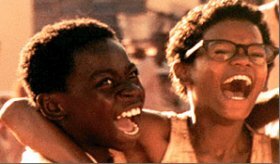|
|
| Tookey's Review |
|
| Pro Reviews |
|
| Mixed Reviews |
|
| Anti Reviews |
|
| Cast |
|
| |
 |
| |
| Released: |
2002 |
| |
|
| Genre: |
DRAMA
RITES-OF-PASSAGE
FOREIGN
CRIME
|
| |
|
| Origin: |
Brazil |
| |
|
| Colour: |
C |
| |
|
| Length: |
135 |
|
| |
|
| |
|
|
| |
|
|
Brazilian director Fernando Meirelles contrasts two children growing up in the slums of Rio de Janeiro. One, Li'l Dice, becomes a drug lord, rapist and mass killer (Leandro Firmino da Hora). The other, Rocket, turns into an intrepid photo-journalist (Alexandre Rodrigues), and it's through his eyes that we see the world in which they both live.
|
Reviewed by Chris Tookey
|
|
Meirelles is clearly much enamoured of MTV pop videos, Boogie Nights and Quentin Tarantino, for both good and ill. From the opening sequence, where a panicky, pot-bound chicken (who, as we see later, symbolises Rocket) makes a dash for freedom, pursued by gun-waving pre-pubescents, visual energy and directorial confidence are extravagantly on display.
|
|
The director distinguishes cleverly between the naive, colourful Sixties, when Li'l Dice is a lone child psychopath; the darker, edgier Seventies, when the two boys make their decisive career choices; and the Eighties, when the shooting and editing become nightmarishly fragmented, to reflect a world where Li'l Dice's amorality is no longer exceptional, but the norm.
Events are seen with a photographer's eye, as is only appropriate since our narrator has two of them. But so involved is Meirelles with the rise of his pint-sized Godfather that he forgets to characterise his hero.
|
|
Rocket has little to do until the final segment of the movie except wonder why he never gets the prettiest girl in the slum, and commentate upon the rise of gangsterism in a flat, non-judgmental tone that's a little too reminiscent of Ray Liotta's equivalent commentary in GoodFellas.
The result is that, though the pictorial style remains gripping, there is no one to root for; and the content becomes tediously repetitive, with killing following killing, bloodbath following bloodbath. Even the shock value of seeing eight year-olds carry real guns diminishes.
Although the subject-matter and setting resemble Pixote, Hector Babenco's acclaimed film about street-children in Sao Paolo, City of God engenders nothing like the same degree of pathos or emotional involvement.
Also missing, curiously for a film that's based on a fact-packed novel, ais nything that marks the characters out as Brazilian. There is hardly any mention of the Catholic church, and scarcely any reference to the secular religion of Soccer. As in any generic North American film on the subject, parents and teachers are notable by their absence; and the State is represented only by a cowardly, corrupt police force.
|
|
In the end, the film becomes rather too much like any other chronicle of children turning into hoodlums, from Angels With Dirty Faces to Boyz N The Hood.
Meirelles also needed to ingratiate himself with the drug lords who continue to dominate the slums where he was shooting, so he has studiously avoided any trace of moral judgmentalism. This is how things are, the film is saying; it is up to you, the audience, to say how things should be.
Even so, the film makes an impact. The untrained actors are frighteningly authentic. Robbing and killing is to them as natural and casual an act as hitting the right button is for British or American children on a PlayStation 2.
There are times when this film comes uncomfortably close to reflecting the direction crime is taking on our own inner-city streets.
The underlying message of City of God is both cautionary and relevant: that a society which washes its hands of its underclass and turns a blind eye to drugs condemns generations of young people to a worthless life and premature death.
Not only will the criminals take plenty of innocent people with them - for these people are doing a lot of harm to others, by selling drugs to people outside their slum.
Many potentially good young people will turn to crime when this is the only career option, the one way to win respect within the community.
It is to some extent a fair criticism of City of God that it glamorises gangsterism. At the same time it performs a valuable function in exposing, and implicitly blaming, a society so apathetic that it allows drug-financed criminality to spread like a deadly plague.
|
|
|
|
|
